ICSE Full Form – What is ICSE Board?
Comparison with CBSE & Full Details (2025)
What is ICSE Board?
ICSE stands for Indian Certificate of Secondary Education. It is an examination conducted by the Council for the Indian School Certificate Examinations (CISCE) for students of Class 10. its Primary Know As Best Board in india Than Any other Board. Its Simply Consider As a Hard Board Than Other Board Because its Syllabus is so Deeply. This exam is held by a group called the CISCE (Council for the Indian School Certificate Examinations).
About ICSE Board?
Full Form: Indian Certificate of Secondary Education
Conducted by: CISCE (Council for the Indian School Certificate Examinations)
Grade Level: Class 10 board exam
Medium of Instruction: English
Type: Private, non-governmental board of school education in India
ICSE Full Form
The Full Form of ICSE is Indian Certificate of Secondary Education And Full Name is Council for the Indian School Certificate Examinations. The Headquarter of ICSE is New Delhi.
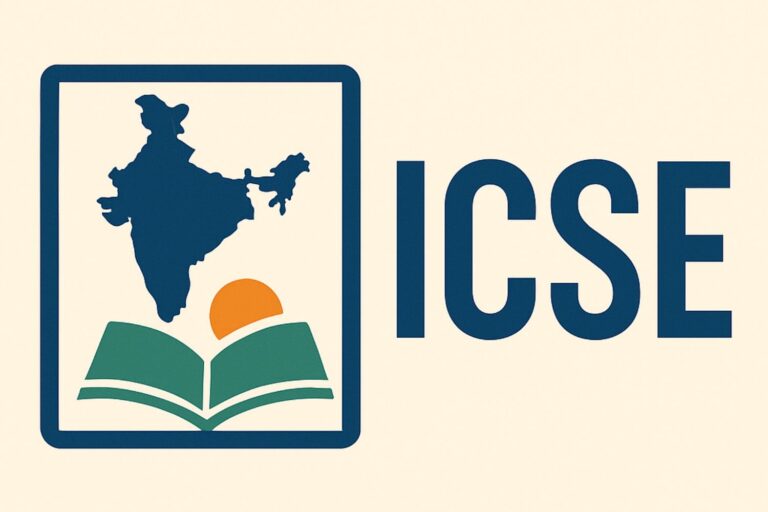
About CISCE – The Council Behind ICSE
The Council for the Indian School Certificate Examinations (CISCE) is the national-level education board in India that conducts the ICSE (Class 10) and ISC (Class 12) exams. It is a private, non-governmental board, well-known for its high academic standards, especially in English-medium education.
Key Facts About CISCE:
Full Name: Council for the Indian School Certificate Examinations
Established: 1958
Headquarters: New Delhi, India
Type: Private Board of Education
Languages of Instruction: English
Exam Conducted:
ICSE – Indian Certificate of Secondary Education (Class 10)
ISC – Indian School Certificate (Class 12)
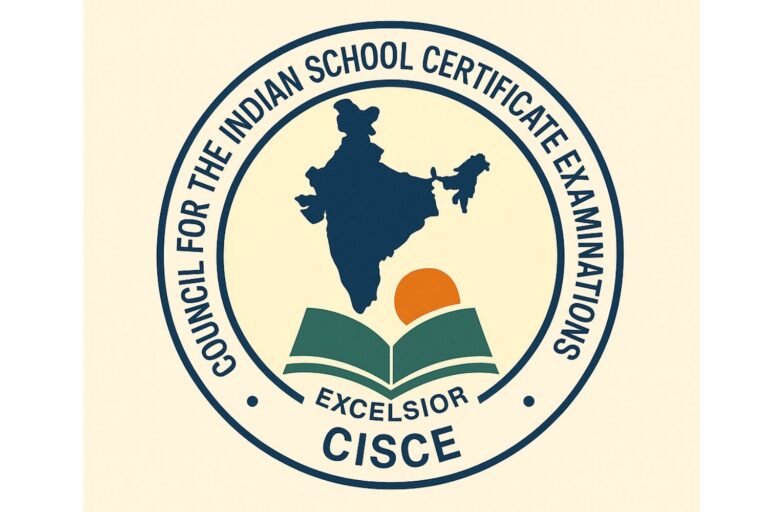
Purpose and Objectives of CISCE:
- To deliver high-quality education in English.
- To ensure balanced curriculum with focus on languages, arts, and sciences.
- To promote analytical thinking, creativity, and global awareness.
- To conduct fair and transparent examinations for secondary and higher secondary levels.
History Of Icse Board
The roots of ICSE go back to Cambridge University, which used to conduct exams for Indian students during British rule.
After India’s independence, there was a strong need to create an Indian version of that exam system — something that would maintain high standards but also suit Indian students and culture.
So, in 1958, the University of Cambridge recommended setting up an Indian council to handle this — and that’s how the CISCE was formed.
When Did ICSE Board Start?
The first ICSE exam was conducted in 1973, under the guidance of CISCE.
Since then, ICSE has grown to become one of the most respected school boards in India.
When Did ICSE Board Start?
Strong English Base:
ICSE schools teach in English, which helps students build a strong command over the language — useful for global education and international jobs.Focus on All Subjects:
Whether you like science, literature, or commerce, ICSE gives you a chance to shine in every field.Internal Projects & Practical Work:
Students are encouraged to do project work, group activities, and assignments — not just memorize and write exams.Respected Globally:
ICSE certificates are accepted by many foreign universities in the UK, USA, Canada, Australia, etc.
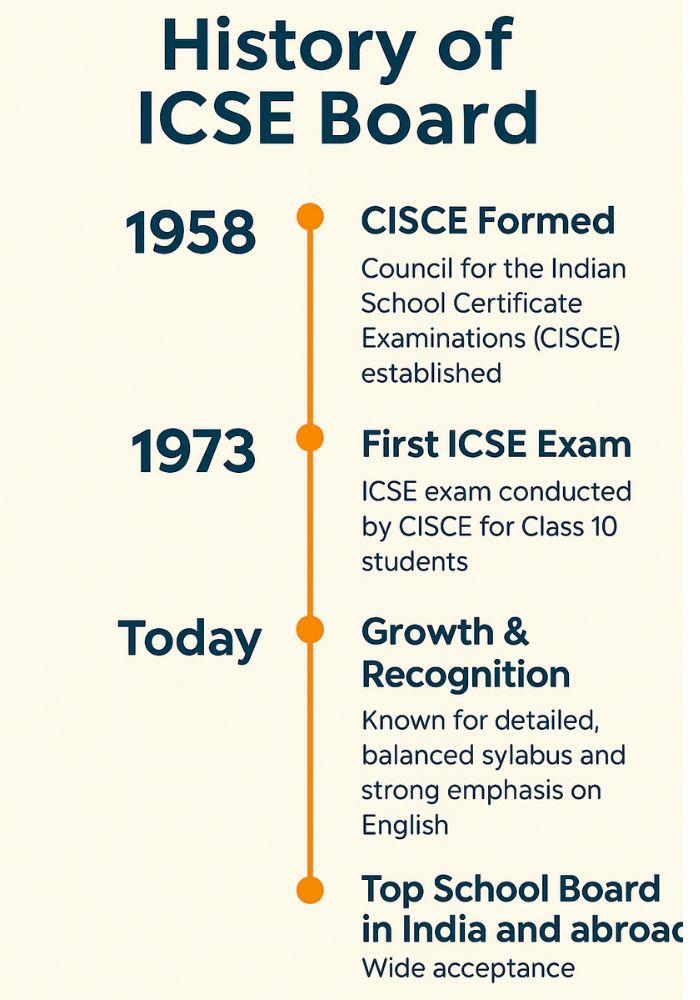
ICSE Curriculum Structure – Complete Overview
The ICSE (Indian Certificate of Secondary Education) curriculum is known for its comprehensive, balanced, and detailed structure. It doesn’t just focus on marks — it focuses on building concepts, skills, and a strong academic foundation.
Classes Covered Under ICSE:
ICSE is conducted for Class 10
The syllabus for Classes 1 to 10 is framed by the schools under CISCE guidelines
Subjects in ICSE Are Divided into Three Groups (for Class 9 and 10):
✅ Group 1 (Compulsory Subjects)
These subjects are mandatory for all students:
English
Second Language (e.g. Hindi, Regional Language, or Foreign Language)
History, Civics & Geography (combined)
✅ Group 2 (Choose Any 2 Subjects)
Students can choose two subjects from this group:
Mathematics
Science (Physics, Chemistry, Biology)
Economics
Commercial Studies
Environmental Science
✅ Group 3 (Choose Any 1 Subject)
This group offers more creative and skill-based subjects:
Computer Applications
Art
Home Science
Fashion Designing
Cookery
Performing Arts
Physical Education
Technical Drawing
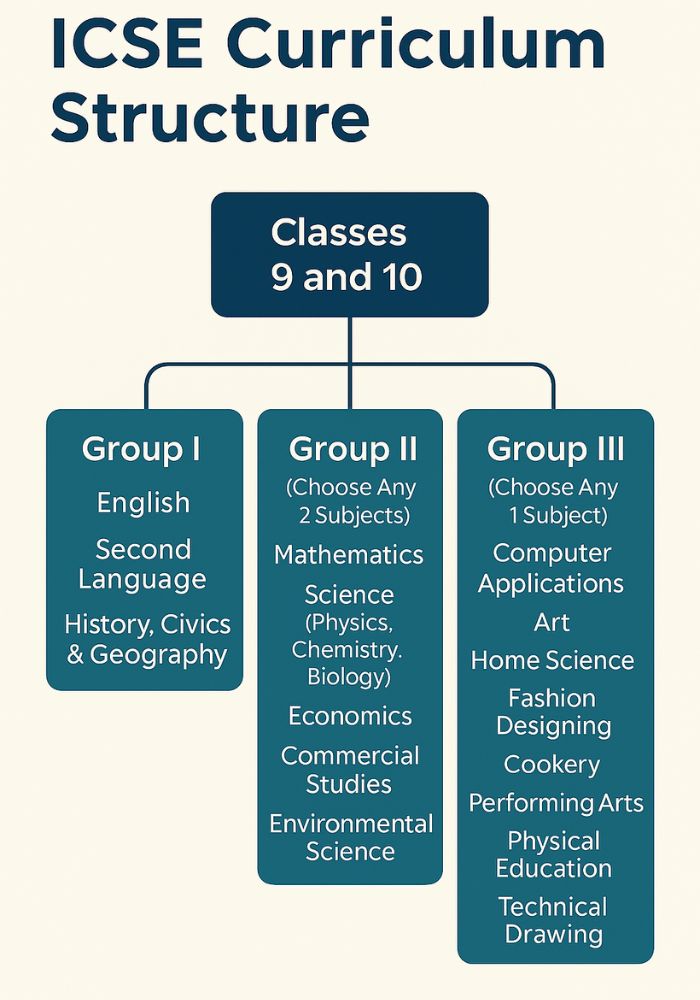
ICSE Grading System – Explained Simply
The ICSE Board uses a numeric grading system to evaluate students’ performance in Class 10 exams. This grading system helps measure both theory and practical/project work, depending on the subject.
ICSE Grading System for Class 10 Board Exams:
✅ Note: Grades 1 to 5 are usually considered as “Pass” grades.
Key Points About ICSE Evaluation:
Theory + Practical: Some subjects have both written exams and internal assessments (like lab work or projects).
Internal Marks: Subjects like Computer Applications, Science, and Art include 20%–50% internal marks.
No Overall Percentage: ICSE does not calculate a total percentage; schools often convert grades into percentages separately.
Subject-Wise Report Card: Students get grades for each subject individually, showing theory and internal marks breakdown.
Is CGPA Used in ICSE?
No, CGPA (Cumulative Grade Point Average) is used in CBSE, not in ICSE. The ICSE board gives subject-wise grades only.
Eligibility of Schools for ICSE Affiliation
If a school wants to offer ICSE curriculum and get affiliated with CISCE (Council for the Indian School Certificate Examinations), it must meet certain requirements. These rules ensure that the school maintains high standards in teaching, infrastructure, and student development.
Key Eligibility Criteria for ICSE Affiliation:
1. 🏗️ Infrastructure Requirements
The school must have a permanent building and a safe learning environment.
There should be well-equipped classrooms, science labs, computer labs, and a library.
Clean drinking water, proper sanitation, and separate toilets for boys and girls are mandatory.
2. 🎓 Medium of Instruction
English must be the primary language of instruction.
Teachers and students should be able to communicate effectively in English.
3. 👩🏫 Qualified Teachers
The school must have well-trained and qualified teachers as per CISCE norms.
Teachers should be capable of teaching as per the ICSE syllabus.
Regular teacher training programs are encouraged.
4. 📝 Academic Facilities
The school should have a proper plan for teaching ICSE syllabus from Class 1 to Class 10.
There must be arrangements for internal assessments, project work, and extracurricular activities.
5. 📄 Legal Status & Recognition
The school must be recognized by the state or union territory government.
It should be run by a registered society, trust, or company under the relevant act.
The school should have non-proprietary character, i.e., it should not be run for profit.
6. 📊 Student Strength & Class Ratios
There should be an adequate number of students and teacher-student ratio should be balanced.
Classrooms must be spacious and not overcrowded.
7. 🔍 Inspection & Verification
CISCE sends an inspection team to evaluate the school’s facilities and readiness.
Only if the school meets all standards, affiliation is granted.
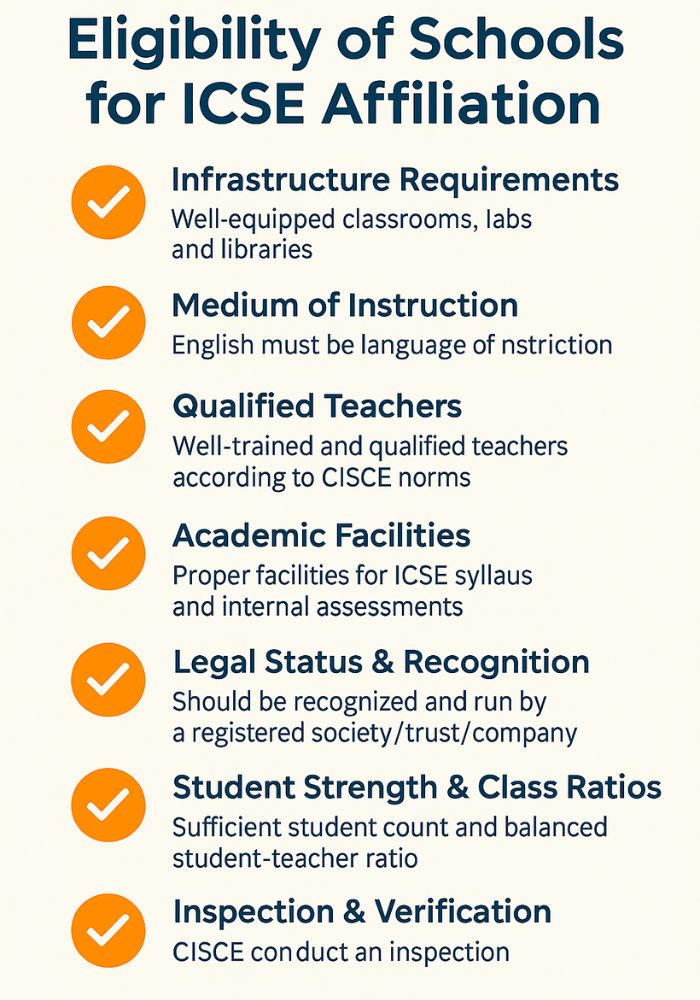
Advantages of ICSE Board
The ICSE (Indian Certificate of Secondary Education) board is known for its strong academic foundation, global recognition, and balanced curriculum. Here are the key reasons why ICSE is considered one of the best education boards in India:
✅ 1. Strong Focus on English Language
ICSE places a high emphasis on English grammar, vocabulary, and writing.
Students from ICSE backgrounds often perform better in competitive exams and international universities due to their fluency in English.
✅ 2. Detailed & Balanced Curriculum
The ICSE syllabus is comprehensive and well-structured.
Equal importance is given to Science, Mathematics, Languages, Arts, and Humanities.
Helps students develop all-round knowledge and not just academic marks.
✅ 3. Application-Based Learning
The ICSE board encourages understanding and analysis, not just rote memorization.
Subjects are taught in a way that promotes critical thinking and creativity.
✅ 4. Internal Assessments & Practical Learning
Students are graded on projects, lab work, and class activities, not just final exams.
This helps build real-world skills and confidence early on.
✅ 5. Wide Subject Options
In Classes 9 & 10, students can choose from a diverse range of subjects:
Computer Applications, Environmental Science, Art, Performing Arts, Home Science, and more.
This allows students to customize their learning path based on interests.
✅ 6. Global Recognition
ICSE certificates are accepted worldwide, especially in countries like the UK, USA, Australia, and Singapore.
ICSE students often find it easier to get into international schools and colleges.
✅ 7. Great for Personality Development
With emphasis on language, presentations, and projects, ICSE students develop better communication skills.
Encourages overall grooming through arts, culture, and extracurriculars.
✅ 8. Good Base for Competitive Exams
Though the syllabus is vast, ICSE builds a deep conceptual understanding.
Students are well-prepared for NEET, JEE, UPSC, and even foreign exams like SAT, IELTS, or TOEFL.
🎓 Who Should Choose ICSE?
ICSE is perfect for:
Students who want strong command over English
Those interested in foreign education or global careers
Students who prefer in-depth learning with real-world application
⚠️ Disadvantages of ICSE Board
While the ICSE Board is known for its rich curriculum and strong English foundation, it’s important to also understand the challenges or disadvantages that come with it. This helps students and parents make an informed decision.
❌ 1. Syllabus is Vast and Detailed
The ICSE syllabus is more detailed and lengthy compared to CBSE or State Boards.
Students may feel overwhelmed, especially if they are not used to deep learning or regular study.
❌ 2. High Pressure on Projects & Internal Assessments
ICSE gives importance to project work and internal marks, which increases the overall workload on students.
Not every student enjoys continuous evaluations or group assignments.
❌ 3. Limited Number of ICSE Schools
ICSE-affiliated schools are fewer in number, especially in small towns or rural areas.
This makes it difficult for students to switch schools or find tuition support.
❌ 4. Transition to State Board/CBSE is Tough
If a student needs to transfer from ICSE to CBSE or a State Board, they may struggle to match the format and style of questions.
The depth of ICSE subjects is often not aligned with other boards.
❌ 5. More Focus on Theory in Some Subjects
While ICSE is known for balance, in some subjects (like History or Civics), the syllabus can be theory-heavy, leading to memorization.
❌ 6. Cost of Education is Generally Higher
Most ICSE schools are private and English-medium, which means higher tuition fees and extra expenses on books, projects, etc.
It may not be affordable for all families.
❌ 7. No State Language Focus
Since ICSE follows English as the medium, state languages often get less attention, which can be a drawback for students preparing for regional government exams.
ICSE vs CBSE – Which Education Board is Right for You?
When choosing the right board for your child, one of the biggest decisions is between ICSE (Indian Certificate of Secondary Education) and CBSE (Central Board of Secondary Education). Both are respected across India and abroad, but they serve different learning styles, goals, and career paths.
Let’s break it down in the simplest way possible:
🏛️ About the Boards
| Factor | ICSE | CBSE |
|---|---|---|
| Full Form | Indian Certificate of Secondary Education | Central Board of Secondary Education |
| Managed By | CISCE – a private, non-government board | Ministry of Education, Government of India |
| Established | 1958 | 1962 |
| Type | Private Board | National Government Board |
📚 Curriculum Style
| Aspect | ICSE | CBSE |
|---|---|---|
| Focus Area | Strong on Language, Arts, Science | Strong on Maths, Science, Concept Clarity |
| Teaching Method | Application-based, Project work, Creative | Concept-focused, Straightforward, Exam-oriented |
| Syllabus Detail | Deep and analytical | Concise and logical |
| Language Medium | English only | English & Hindi both |
Verdict:
✅ Choose ICSE if your child loves literature, creativity, and balanced learning.
✅ Choose CBSE if your child is focused on engineering, medical or competitive exams.
🎓 Subject Flexibility
ICSE offers a wider range of subjects including:
Computer Applications
Environmental Science
Performing Arts
Home Science
Fashion Designing
Technical Drawing
CBSE sticks to core academic subjects, ideal for JEE/NEET/UCEED aspirants.
🧪 Assessment Style
| Factor | ICSE | CBSE |
|---|---|---|
| Projects / Practicals | More weightage (up to 20–30%) | Less weightage (mostly theory-based) |
| Exam Pattern | Descriptive, detailed answers | Balanced between short and long answers |
🌍 Recognition and Scope
| Factor | ICSE | CBSE |
|---|---|---|
| India Recognition | Moderate (fewer schools) | High (available in all cities & states) |
| Global Acceptance | Very High | Good |
| Ease of Transfer | Difficult due to fewer ICSE schools | Easy because CBSE is widely available |
💰 Cost & Accessibility
ICSE Schools are mostly private and often charge higher fees.
CBSE Schools are available in both private and government setups, making them more affordable and accessible.
🧠 Which Board is Tougher?
ICSE is considered slightly tougher because it goes deeper into every topic.
CBSE is easier to manage, especially if you’re preparing for entrance exams.
📝 Quick Summary – Which One Should You Choose?
| You should choose… | If you want… |
|---|---|
| ✅ ICSE | Strong English skills, global career path, balanced learning |
| ✅ CBSE | Affordable schooling, national exam prep (JEE/NEET), easy transfers |

